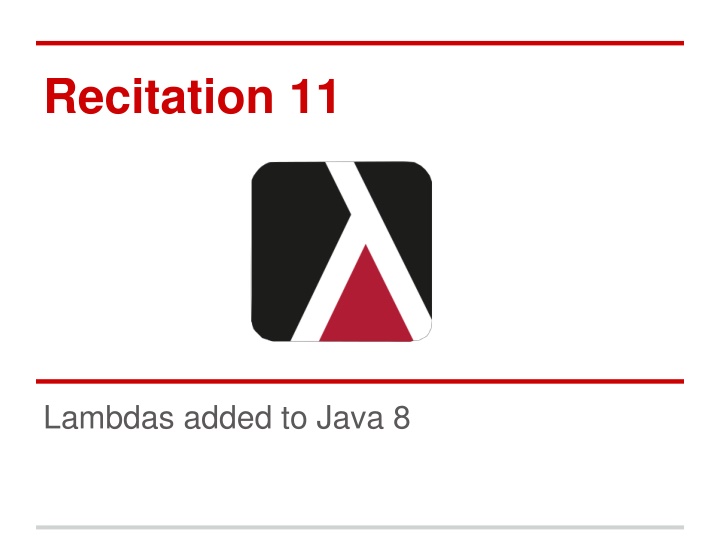
Lambdas in Java 8
Learn how lambdas were introduced in Java 8 and how they revolutionized the way we write code, making it more concise and expressive. Explore examples of customizing comparisons, using anonymous inner classes, and implementing complex lambdas. Practice sorting and manipulating data using lambdas for a more efficient coding experience.
Download Presentation

Please find below an Image/Link to download the presentation.
The content on the website is provided AS IS for your information and personal use only. It may not be sold, licensed, or shared on other websites without obtaining consent from the author. If you encounter any issues during the download, it is possible that the publisher has removed the file from their server.
You are allowed to download the files provided on this website for personal or commercial use, subject to the condition that they are used lawfully. All files are the property of their respective owners.
The content on the website is provided AS IS for your information and personal use only. It may not be sold, licensed, or shared on other websites without obtaining consent from the author.
E N D
Presentation Transcript
Recitation 11 Lambdas added to Java 8
Customizing Comparison new TreeSet<E>() - uses compareTo built into the elements But what it you want to use a different order? - reverse order - case insensitive TreeSet s constructor can take a Comparator: - new TreeSet<K>(Collections.reverseOrder())
Anonymous Inner Class Goal: sort non-negative integers modulo n Can access variables that are assigned to exactly once int n = ; // > 0 = new TreeSet<Integer>( new Comparator<Integer>() { public int compare(Integer x, Integer y) { return x % n y % n; } } }); This is clunky! Old Java
Lambdas Only one abstract method to implement, so we can use a lambda! Can still access variables that are assigned to exactly once int n = ; // > 0 = new TreeSet<Integer>( ( x, ); Integer Integer y) -> x % n y % n arrow expression parameters Java takes care of turning this lambda into a Comparator
Try it Out /** Print out the lower-cased versions of the * non-empty strings in strs in order of length. */ public void practice(List<String> strs) { // no loops! strs.removeIf( ); strs.replaceAll( ); strs.sort( ); strs.forEach( ); }
Answer /** Print out the lower-cased versions of the * non-empty strings in strs in order of length. */ public void practice(List<String> strs) { // no loops! strs.removeIf(s -> s.isEmpty()); strs.replaceAll(s -> s.toLowerCase()); strs.sort((s1, s2) -> s1.length() s2.length()); strs.forEach(s -> System.out.println(s)); }
More Complex Lambdas /** Maps [a, b, c] to [a, a, b, b, c, c] */ public <T> List<T> doubleList(List<T> list) { List<T> d = new ArrayList<T>(); list.forEach(t -> { d.add(t); d.add(t); }); return d; } block braces
More Complex Lambdas List<List<Integer>> lists = ; // no nulls // sort so that [1, 3] is before [2, 4, 5] lists.sort((List<Integer> left, List<Integer> right) -> { if (left.size() > right.size()) return left.size() right.size(); for (int i = 0; i; < left.size(); i++) if (left.get(i) > right.get(i)) return left.get(i) right.get(i); return left.size() right.size(); }); The lambda s block can return values!
Try it Out /** Remove any non-increasing elements. */ public void filter(List<List<Integer>> lists) { }
Answer /** Remove any non-increasing elements. */ public void filter(List<List<Integer>> lists) { lists.removeIf((List<Integer> list) -> { int prev = Integer.MIN_VALUE; for (int i : list) // Ignoring nulls if (prev > i) return true; else prev = i; return false; }); }
Difference: Fields Anonymous classes can have fields /** Maps [3, 4, 5] to [3, 7, 12] */ public void sumPrev(List<Integer> ints) { ints.replaceAll(new UnaryOperator<Integer>() { int sum = 0; public Integer apply(Integer i) { sum += i; return sum; } }); }
Difference: this class Foo { void bar() { baz(new Anon() { Object func() { class Foo { void bar() { baz(() -> this); } } return this; } }); } Watch out!!! }
